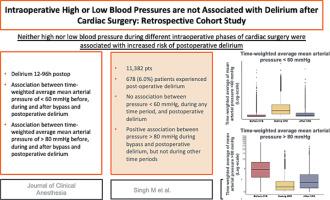术中高血压和低血压与心脏手术后谵妄无关:回顾性队列研究
IF 5.1
2区 医学
Q1 ANESTHESIOLOGY
引用次数: 0
摘要
研究目的评估心肺旁路术前、术中和术后术中时间加权平均动脉压的高低与术后谵妄的关系.设计单中心回顾性队列研究.设置手术室和术后护理病房.患者2017年1月至2020年12月期间在克利夫兰诊所主校区接受心脏手术需要心肺搭桥的11382名18岁或18岁以上的患者.干预所有需要搭桥的心脏手术,需要深低温循环停止的手术除外.测量术后谵妄在术后12至96小时内使用意识模糊评估法和简短意识模糊评估法进行评估。低血压和高血压的定义是时间加权平均平均动脉压为60和80毫米汞柱。主要结果11382名患者中有678人(6.0%)出现术后谵妄。在心肺旁路术前、术中或术后,低血压(时间加权平均动脉压 < 60 mmHg)和高血压(时间加权平均动脉压 > 80 mmHg)与术后谵妄之间的关系经混杂因素调整后,使用多变量逻辑回归模型进行统计并无显著性或临床意义。结论这项大型单中心队列分析没有发现任何证据表明,心脏手术术中不同阶段的高血压或低血压与术后谵妄有关。本文章由计算机程序翻译,如有差异,请以英文原文为准。

Intraoperative high and low blood pressures are not associated with delirium after cardiac surgery: A retrospective cohort study
Study objective
To evaluate the associations between high and low intraoperative time-weighted average mean arterial pressures before, during and after cardiopulmonary bypass on postoperative delirium.
Design
Single center retrospective cohort study.
Setting
Operating rooms and postoperative care units.
Patients
11,382 patients, 18 years of age or older who had cardiac surgery requiring cardiopulmonary bypass between January 2017 and December 2020 at the Cleveland Clinic Main Campus.
Interventions
All cardiac surgery requiring bypass except procedures requiring deep hypothermic circulatory arrest.
Measurements
Post operative delirium was assessed from 12 to 96 h postoperatively, using the Confusion Assessment Method and brief Confusion Assessment Methods. Hypotension and hypertension were defined as time-weighted average mean arterial pressure < 60 and > 80 mmHg.
Main results
Postoperative delirium occurred in 678 (6.0 %) of 11,382 patients. Confounder-adjusted associations, using multivariable logistic regression models, between hypotension (time-weighted average mean arterial pressure < 60 mmHg) and hypertension (time-weighted average mean arterial pressure > 80 mmHg) and postoperative delirium were not statistically significant or clinically meaningful before, during, or after the cardiopulmonary bypass.
Conclusions
This large single-center cohort analysis found no evidence that exposure to high or low blood pressures during various intraoperative phases of cardiac surgery are associated with postoperative delirium.
求助全文
通过发布文献求助,成功后即可免费获取论文全文。
去求助
来源期刊
CiteScore
7.40
自引率
4.50%
发文量
346
审稿时长
23 days
期刊介绍:
The Journal of Clinical Anesthesia (JCA) addresses all aspects of anesthesia practice, including anesthetic administration, pharmacokinetics, preoperative and postoperative considerations, coexisting disease and other complicating factors, cost issues, and similar concerns anesthesiologists contend with daily. Exceptionally high standards of presentation and accuracy are maintained.
The core of the journal is original contributions on subjects relevant to clinical practice, and rigorously peer-reviewed. Highly respected international experts have joined together to form the Editorial Board, sharing their years of experience and clinical expertise. Specialized section editors cover the various subspecialties within the field. To keep your practical clinical skills current, the journal bridges the gap between the laboratory and the clinical practice of anesthesiology and critical care to clarify how new insights can improve daily practice.

 求助内容:
求助内容: 应助结果提醒方式:
应助结果提醒方式:


